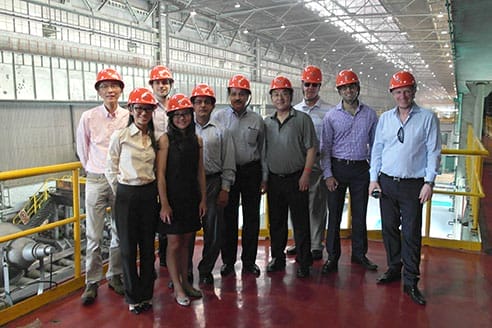Seeing the Chinese Walls for Themselves
It was visiting companies in China, says Wharton’s Mark O. Winkelman Professor Tom Donaldson, that made him realize how important “the wall” was in China.
The Great Wall? No. A display of photos showing company executives alongside Chinese government officials often hung near the executive offices.
“That’s important [to Chinese companies] because it shows employees that the company is connected properly,” he explains.
Donaldson and Wharton management assistant professor Samir Nurmohamed were among a small group of faculty and MBA students who embarked on a Faculty International Seminar (FIS) trip to China in June. A program of Wharton Global Initiatives, FIS takes professors to other countries (past trips have included Japan, Israel, Brazil and Kenya) for an up-close look at business issues related to research and teaching.
Clothing and handbag factories, steel plants, automakers and e-commerce firms—many of them state-owned—were among the companies on the itinerary. Both professors were particularly impressed with Alibaba, an e-commerce firm now listed on the NYSE and bigger than Amazon and eBay combined. Donaldson calls Alibaba’s pioneering approaches “unique” and commented on the firm’s “amazing enthusiasm.” He also notes that among its senior executives is Brian Wong, WG’03, a member of the Wharton Alumni Executive Board who spent time with the FIS group.
Nurmohamed, who studies motivation and behavioral ethics, observes that Chinese workers are not “completely motivated by the communal good” as Americans tend to assume about a socialist system.
“Many of them are starting to be part of the middle class, [and] the companies represent the vehicle for them to change their circumstances,” he says.
At the same time, both professors recognize the ubiquitous influence of the government on industry (as reflected by the aforementioned wall of photos).
“The Chinese, I think, still [feel] that it’s important … because otherwise some of the excesses of capital markets will harm everyone,” says Donaldson, who teaches in the Department of Legal Studies and Business Ethics.
Donaldson predicts that China’s future model will probably look more like Singapore than the U.S. In Singapore, the government weighs heavily in the business equation.
Among other FIS discoveries was a cultural one: at traditional Chinese business meetings, the most senior people are situated at the middle of the table across from each other, with others’ status indicated by how far away they are. Fortunately, says Donaldson, their group included an expert on the Chinese business world—Wharton lecturer Edwin Keh, a former senior vice president of Wal-Mart Global Procurement—who helped the travelers discreetly seat themselves.
—Carole Bernstein

























